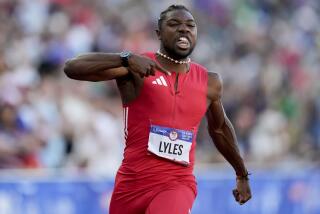U.S. Sprinter Is Suspended
ATHENS — The U.S. track and field program, scandalized by a rash of doping cases, took another blow Monday when sprinter Calvin Harrison, a gold medalist at the 2000 Sydney Games, was suspended for two years for a second violation.
The ruling, unless reversed on appeal, leaves Harrison ineligible for the 2004 Games, which begin in 10 days. He had been named to the 1,600-meter relay pool. His attorney, Ed Williams, of New York, said it was not immediately clear whether they would appeal to the Swiss-based Court of Arbitration for Sport.
The U.S. Anti-Doping Agency said the sanction is the 12th it has announced this year against a track and field athlete, accounting for more than half of the 23 sanctions it has imposed in 2004 against U.S. athletes in all Olympic sports.
Harrison, 30, of Raleigh, N.C., tested positive for the banned stimulant modafinil at last year’s U.S. championships at Stanford. In 1993 he tested positive for pseudoephedrine, a stimulant that was banned at the time but no longer. The second positive test prompted the two-year suspension. The suspension began July 26, the date of the hearing in the case.
Harrison did not attend the hearing, according to the ruling from a three-member arbitration panel.
“We’re pleased that the panel confirmed USADA’s position that athletes are warned not to take drugs, and should be held accountable when they do,” said Travis Tygart, USADA’s chief legal counsel.
Said Williams: “They didn’t accept my argument that track and field officials placed an unfair burden on the athlete.”
The decision leaves the U.S. relay squad and, by extension, the track team, in limbo. The 2004 Games begin Aug. 13; U.S. officials have a few days after that, until just before the track and field competition begins, to finalize the U.S. roster.
George Williams, the head U.S. men’s track coach for the 2004 team, could not be reached for comment.
Harrison won a gold medal in the 1,600-meter relay at Sydney.
His twin brother, Alvin, the silver medalist in the 400 at Sydney, was also on the winning 1,600-meter relay team.
The IOC might strip the entire 2000 U.S. 1,600-meter team of its medals because Jerome Young, who ran in the early rounds, tested positive in 1999 for the banned steroid nandrolone.
USADA, meantime, is seeking a lifetime ban against Alvin Harrison and three others, relying in part on evidence obtained through the prosecution of the BALCO case in federal court in San Francisco. The others are Tim Montgomery, world-record holder in the 100-meter dash; Michelle Collins, the 2003 world indoor 200-meter winner; and Chryste Gaines, two-time Olympic relays medalist.
In the criminal case, four men, including BALCO founder Victor Conte, are facing a welter of federal charges, including allegations of distribution to athletes of banned substances such as the designer steroid THG. Each has pleaded not guilty.
Of the 12 track-related sanctions USADA has announced in 2004, four involve THG: middle distance champion and three-time Olympian Regina Jacobs; hammer throwers John McEwen, runner-up at the 2003 U.S. championships, and Michelle Phillips, the 2003 U.S. women’s winner; and Kevin Toth, the 2003 U.S. shotput champion.
Jacobs announced her retirement but nonetheless was hit with a four-year ban; the other three received two-year suspensions.
In January, sprinter Mickey Grimes, the 100-meter champion at last year’s Pan American Games, received a public warning after testing positive in 2003 for the stimulant ephedrine. He tested positive in May for a banned steroid and now faces suspension.
In April, warnings went out to four track and field standouts after positive tests for modafinil, a prescription drug used to treat the sleeping disorder narcolepsy: sprinter Gaines and hurdlers Chris Phillips, Eric Thomas and Sandra Glover.
Kelli White, last year’s 100- and 200-meter world champion, acknowledged in May that she had used modafinil, steroids and the blood-booster EPO. She accepted a two-year ban.
Triple jumper Tim Rusan tested positive for marijuana at a meet in May in Rio de Janeiro. He was warned but not suspended.
The recently concluded U.S. Olympic trials in Sacramento were marked by the disclosure of positive tests involving Grimes; hurdler Larry Wade (steroid); and sprinter Torri Edwards (the stimulant nikethamide). Edwards’ case is currently before track’s worldwide governing body, the International Assn. of Athletics Federations; she had qualified for the 100- and 200-meter races in Athens.
More to Read
Go beyond the scoreboard
Get the latest on L.A.'s teams in the daily Sports Report newsletter.
You may occasionally receive promotional content from the Los Angeles Times.






